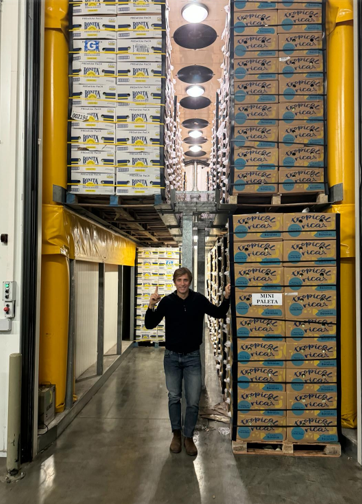 Bananas are one of the most popular fruits in the world and a driving force of the agrifood industry. "They are grown in 150 countries in the world and are the most commercialized fruit and vegetable product on an international level. They represent the third most sold product in the agrifood sector," reports Attilio Pagni (in the photo), sales manager and the fourth generation working at Alimentari Ortofrutticoli ABC.
Bananas are one of the most popular fruits in the world and a driving force of the agrifood industry. "They are grown in 150 countries in the world and are the most commercialized fruit and vegetable product on an international level. They represent the third most sold product in the agrifood sector," reports Attilio Pagni (in the photo), sales manager and the fourth generation working at Alimentari Ortofrutticoli ABC.
The per-capita consumption of bananas in Italy amounts to 10 kg/year and often the product reflects the commercial policies of distribution chains (just think of the special promotions at €0.99/kg, for example, ed.). Italy boasts four macro-groups of bananas: standard, organic, Fairtrade organic and Fairtrade standard. Each has its own price range, from the lowest for standard fruit to the highest for Fairtrade organic bananas, i.e. from €1 and almost €3/kg."
"Bananas are eaten all year round, but sales peak in March, April and May, with a drop during summer. Consumption increases despite the 18% rise in inflation registered over the past few years. The mild winter and the lack of frost so far hastened the arrival of domestic seasonal fruit on the markets, which will affect the consumption of bananas. However it will be a breath of fresh air for domestic crops, which suffered a lot over the past few years."
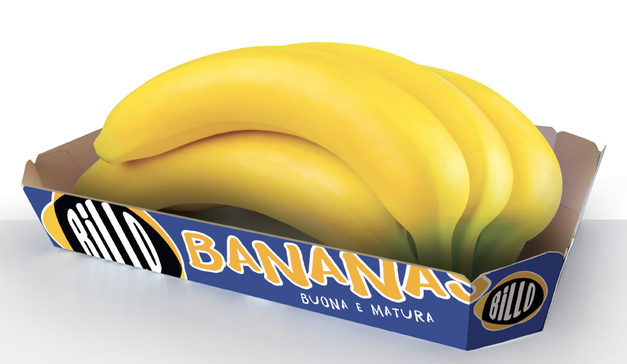 | 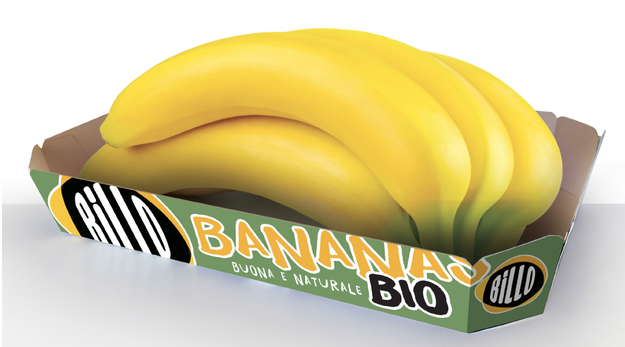 |
"Most bananas currently come from producer partners in Costa Rica and Ecuador, and are mainly sold under our Billo brand," says Pagni.
According to Pagni, when it comes to importers the Italian market is increasingly focusing on large companies rather than on newcomers/occasional traders. "This means prices are less volatile and procurement is more regular when it comes to both imports and sales. The big retail chain has been of fundamental help over the past few decades. Thanks to annual contracts with pre-established volumes and prices, we manage to plan our work better and provide guarantees to all links part of the chain, therefore optimizing costs."
Bananas are also affected by considerable criticalities. "The main problems over the past few years have been of a geopolitical (international conflicts), economic (reduced purchasing power of families) and climatic nature. Climate change, just to make an example, can negatively affect not only the quality and volumes produced, but also the regularity of maritime transport (see the drought in the Panama Canal). All this leads to increased costs and gaps in supply that not only create difficulties on an organizational level, but also undermine the economic sustainability of a deeply-stresses chain. There is no easy solution, but we should try to value the product more."
But how? "It is not easy, but investments in chain agreements and communication are definitely two of the viable options. Just look at what has been done for potatoes."
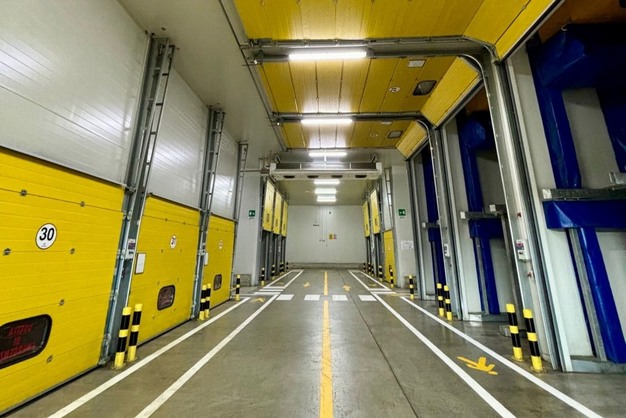
The new ripening, processing and storage center in Bergamo
Italy likes bananas from central and south America. "Ecuador, Costa Rica and Colombia are the main origins. Ecuador is also the leading exporter in the world. Cavendish is the most popular variety: fruits boast a tougher peel and a better appearance, but they are also sought after for their longer shelf-life, as they are subjected to less climatic stress at origin."
Alimentari Ortofrutticoli ABC annually handles approximately 1.8 million banana boxes, i.e. around 34,000 tons. "We do not sell the fruits when they are green, but 99% of the bananas we sell are indeed ripened in our facilities. The sales channels are the big retail chain (slightly more than 50%) and traditional markets/H&R. At the moment, most boxes come from our partners in Costa Rica and Ecuador. Fruits are commercialized mainly under the Billo brand and under exclusive use brands (Tropical Rica, Costa Sol and Rica). We are also proud of having grown in Italy with the Noboa/Bonita Group (one of the most important private players in Ecuador), with which we are working on numerous projects all over the national territory. We also sell Chiquita bananas. Our strategy is therefore to work with important suppliers that guarantee regular procurement of high-quality, healthy and sustainable produce. Having a wide range of products enables us to fully meet the needs of our clients."
Pagni reports that the company has four ripening, processing and storage centers. "The main one is in Rome and serves central and southern Italy. In the north, we have just started in Bergamo in partnership with the Astra Spa group, which specializes in the supply of logistic and transport services. This is in addition to the facilities in San Pietro in Casale and Livorno, and represents a further step that enables our company to improve internal logistics and the services to our clients. The facility in San Pietro in Casale (Bologna) is mainly dedicated to pears, while that in Livorno is a warehouse for the produce arriving from overseas."
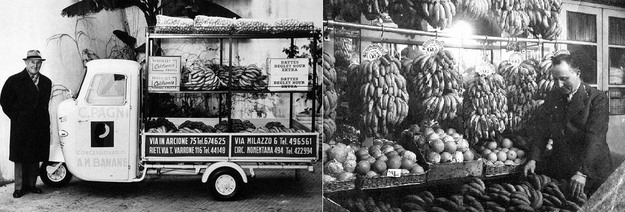
Cherubino Pagni started ripening bananas using artisanal methods
Alimentari Ortofrutticoli ABC
It is a family business that has come to occupy a leading position in the import and distribution of fresh produce in Italy. Cherubino Pagni started ripening bananas using artisanal methods in Rome in 1925. The current company Alimentari Ortofrutticoli ABC Spa (where the acronym stands for Colonial Banana Company) was set up in 1949 by his son Attilio Pagni who, by investing in the historic Magliana facility, created the base for a wider project whose mission was to import vegetables, fruit, exotic fruit and bananas from all over the world. The company is currently managed by Sandro, the president, his son Attilio, his daughter Diletta, his son Gregorio and their cousin Cherubino Pagni.
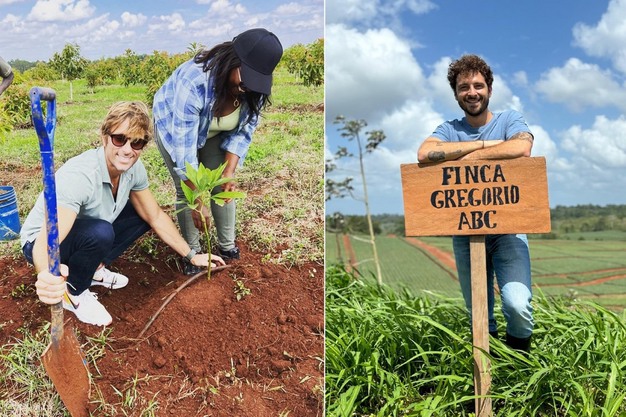 Avocados in Kenya (Attilio Pagni) and pineapples in Costa Rica (Gregorio Pagni)
Avocados in Kenya (Attilio Pagni) and pineapples in Costa Rica (Gregorio Pagni)
The company also works with exotic fruit (pineapples, avocados, mangoes, papayas and to name a few), melons, counter-seasonal fruit (especially citrus fruit and pears) and vegetables. 90% of the produce is imported from abroad.
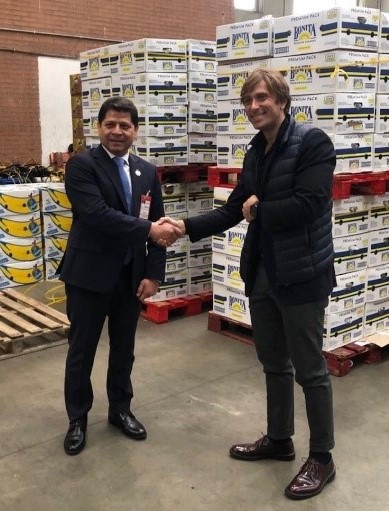 "We have an intensive development program and select, import, prepare and commercialize imported products to big retail chains and traditional markets all over the domestic territory. As for purchases, we maintain a close relationships with many of the leading producers in the various countries of origin. Our mission is to delight consumers providing them with the possibility of finding fruits and vegetables from all over the world all year round. Simple and natural products boasting many benefits and characterized by good health and flavor."
"We have an intensive development program and select, import, prepare and commercialize imported products to big retail chains and traditional markets all over the domestic territory. As for purchases, we maintain a close relationships with many of the leading producers in the various countries of origin. Our mission is to delight consumers providing them with the possibility of finding fruits and vegetables from all over the world all year round. Simple and natural products boasting many benefits and characterized by good health and flavor."
Side photo: a visit by the Ecuador Minister of Agriculture, Danilo Palacios.
During the recent World Banana Forum held in Rome, the company welcomed the Ecuador Minister for Agriculture Danilo Palacios. "He is one of the leading banana producers in Ecuador and I had the chance to listen to his entrepreneurial story. I was fascinated by him on a personal level. In addition, I believe that it is important that for a Minister of Agriculture to have direct experience of the sector."
Photos provided by the company
For further information: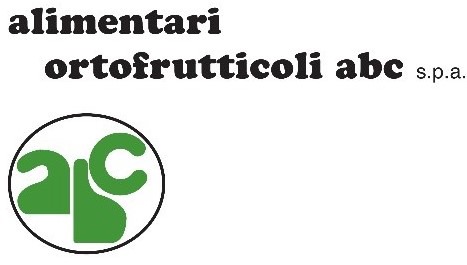 Alimentari Ortofrutticoli ABC Spa
Alimentari Ortofrutticoli ABC Spa
Via Guido Reni 56
00196 Roma - Italy
info@alimentariabc.it
www.alimentariabc.it
